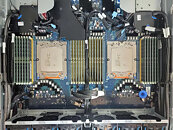- Joined
- Aug 19, 2017
- Messages
- 2,725 (1.01/day)
Yesterday, AMD announced its latest addition to the data center family of processors called EPYC Genoa. Named the 4th generation EPYC processors, they feature a Zen 4 design and bring additional I/O connectivity like PCIe 5.0, DDR5, and CXL support. To disrupt the cloud, enterprise, and HPC offerings, AMD decided to manufacture SKUs with up to 96 cores and 192 threads, an increase from the previous generation's 64C/128T designs. Today, we are learning more about the performance and power aspects of the 4th generation AMD EPYC Genoa 9654, 9554, and 9374F SKUs from 3rd party sources, and not the official AMD presentation. Tom's Hardware published a heap of benchmarks consisting of rendering, compilation, encoding, parallel computing, molecular dynamics, and much more.
In the comparison tests, we have AMD EPYC Milan 7763, 75F3, and Intel Xeon Platinum 8380, a current top-end Intel offering until Sapphire Rapids arrives. Comparing 3rd-gen EPYC 64C/128T SKUs with 4th-gen 64C/128T EPYC SKUs, the new generation brings about a 30% increase in compression and parallel compute benchmarks performance. When scaling to the 96C/192T SKU, the gap is widened, and AMD has a clear performance leader in the server marketplace. For more details about the benchmark results, go here to explore. As far as comparison to Intel offerings, AMD leads the pack as it has a more performant single and multi-threaded design. Of course, beating the Sapphire Rapids to market is a significant win for team red, so we are still waiting to see how the 4th generation Xeon stacks up against Genoa.

View at TechPowerUp Main Site | Source
In the comparison tests, we have AMD EPYC Milan 7763, 75F3, and Intel Xeon Platinum 8380, a current top-end Intel offering until Sapphire Rapids arrives. Comparing 3rd-gen EPYC 64C/128T SKUs with 4th-gen 64C/128T EPYC SKUs, the new generation brings about a 30% increase in compression and parallel compute benchmarks performance. When scaling to the 96C/192T SKU, the gap is widened, and AMD has a clear performance leader in the server marketplace. For more details about the benchmark results, go here to explore. As far as comparison to Intel offerings, AMD leads the pack as it has a more performant single and multi-threaded design. Of course, beating the Sapphire Rapids to market is a significant win for team red, so we are still waiting to see how the 4th generation Xeon stacks up against Genoa.

View at TechPowerUp Main Site | Source



